June 2022 HCH Newsletter
The Connection

In this newsletter:
- Director's Message
- Cost efficient, HCH certified clinics the choice of SEGIP members
- Need to be more resilient? Go back to the basics!
- NEW - HCH Benchmarking Tool
- Learning Together
- Do you have a Health Equity Story?
- Noteworthy
Director's Message
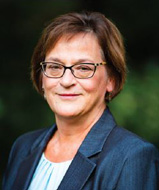 Greetings,
Greetings,
At the beginning of June, many of you received a MNCARES (Minnesota Care Coordination Effectiveness Study) update email. I want to thank you again for your participation in the study. The email and updated timeline can be found here: Health Care Homes - Minnesota Care Coordination Effectiveness Study (state.mn.us)
I am looking forward to learning more about the study’s results and read papers that will come out of the study. As noted in the email, if you have ideas or suggestions about things you would like to learn about or see included in papers please do not hesitate to reach out. The entire study team is committed to producing useful information.
A few other updates:
- The Health Care Home (HCH) Rule Amendment continues to make its way through the rulemaking process and the program will send out a notice when it has made its way through the entire process, and it is approved.
- Thank you to certified care systems who are currently testing the new HCH online certification application and associated resources to ensure the online process works well and the guide/resource supports certification in the best possible way.
Have a great Summer everyone!
~ Bonnie
Cost efficient, HCH certified clinics the choice of SEGIP members
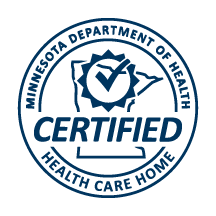
Recognizing that their priorities aligned, in 2019 the Health Care Homes (HCH) Sustainability Workgroup and leadership of the State Employee Group Insurance Program (SEGIP) began a collaborative project to educate SEGIP members about the benefits of HCH certification. The HCH Sustainability Workgroup’s primary objectives are to improve the health of all Minnesotans by ensuring the sustainability of certified HCH clinics and promoting population health and health equity. These goals complement SEGIP’s mission, which is to provide high-quality and cost-effective insurance and benefits to provide access to care and help members achieve and maintain health in every aspect of their lives.
SEGIP administers the MN Advantage Health Plan, the medical insurance program offered to state employees, which encourages members to choose cost-efficient and high-quality clinics. The Advantage Plan covers more than 130,000 members, including employees of state agencies and quasi-state units, their dependents, pre-65 retirees, and other separated employees. Members choose a primary care clinic that manages their care, and each clinic is assigned a cost level between one and four, with one being the most cost-efficient and four the least. Members are encouraged to select lower cost level clinics through reduced cost-sharing.
To help members choose the clinic that best meets their needs, SEGIP maintains a comprehensive online clinic directory that provides information on clinic location, cost level, quality, and now HCH certification status. SEGIP incorporated HCH status prominently on the clinic directory for Open Enrollment 2022, showing if a clinic was HCH certified, providing an informational pop-up that explains what HCH certification means for their care, as well as linking to the HCH website for more information.
While analyzing 2022 enrollment results, SEGIP found that HCH certification was widespread in their clinic network, and the majority of their members chose to receive care at a HCH certified clinic. In addition, those members enrolled at HCH certified clinics had lower average cost levels.
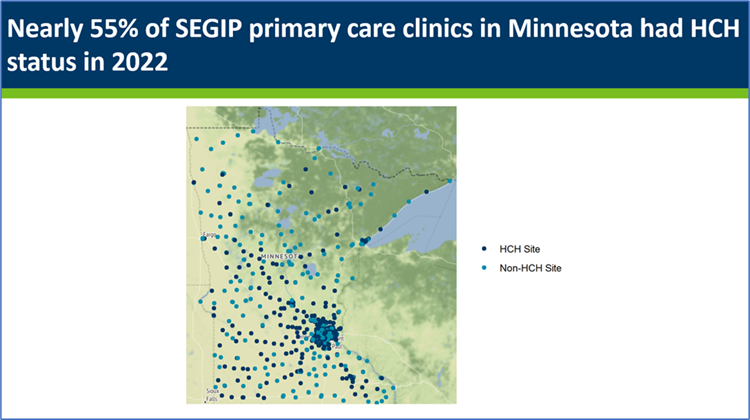
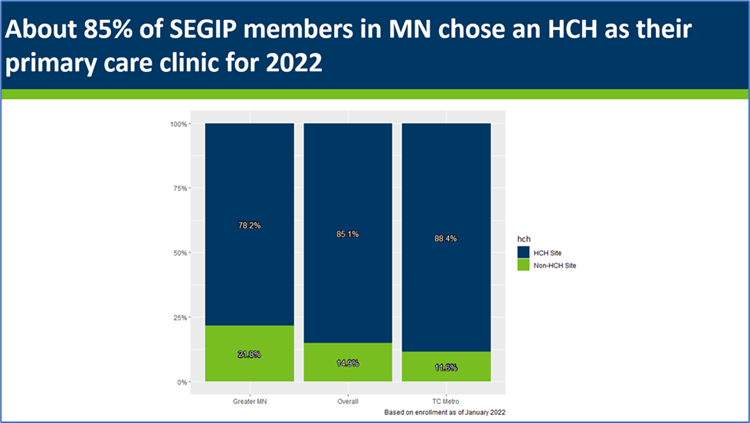
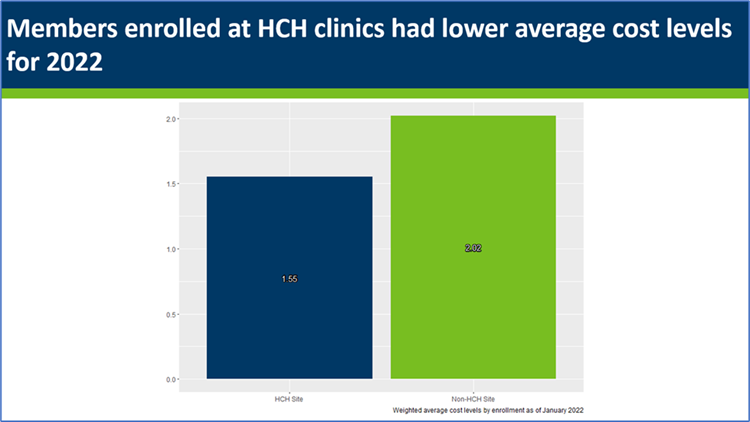
To further this collaboration, HCH and SEGIP will continue to look at new ways to improve awareness and promote the benefits of the HCH model of care. Zach Holmquist, a Senior Health Care Analyst at SEGIP, shared, “Adding Health Care Homes certification to our clinic directory has been a great way to show our members when a clinic emphasizes effective care coordination.”
Need to be more resilient? Go back to the basics!
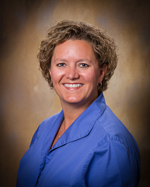
The world we live in can be challenging on most any day, but on those days that we are not feeling at our best or strong enough to face it, it can be overwhelming. No matter where we live, what we do for a living, or how we like to spend our time, we all face the same prices at the gas station and grocery store, share supply chain issues, and wake up to similar news reported.
How are we supposed to stay strong during these challenging times? A local grassroots initiative, Bounce Back Project™, reminds you to go back to the basics. Instead of looking for expensive remedies, perhaps using simple tools to increase your resilience will work just as well! We all have the ability to utilize these simple reminders to increase our overall resilience and well-being. These reminders can be used by all ages and do not have a price tag.
One of the easiest ways to increase our happiness is to do a random act of kindness for someone else. Not only does this make their day better and increase their happiness for the next 24 hours, but you benefit by increasing your own happiness for up to 2 weeks! It’s a win-win for sure and it makes our communities better places to live. Think smiling at others and saying hello, sharing flowers from your garden, kind sidewalk chalk messages, or volunteering locally. Involve your whole family!
Another easy tool is to start writing down 3 good things every day. It can be hard at times, but there is always something to be thankful for. Sunshine, the smell of freshly cut grass, kids playing and laughing, grilling hamburgers – writing down 3 good things for 2 weeks can help increase your happiness for up to 6 months! You basically retrain your brain to look for the positives that are right in front of you every day.
How about writing a letter of gratitude to someone who has made a difference in your life? Sharing a small message (250 words or so) of how and why they impacted you, allows your happiness to increase and depression to lessen. How wonderful to be able to tell them why you appreciate them.
Lastly, maintain social connections with family and friends! These are the people who will help us through life’s toughest moments, listen when we need them most, and allow us to be our authentic self. When we surround ourselves with people who matter to us, we can live a longer, healthier and happier life!
The HCH program thanks Melissa Pribyl MSN RN, CentraCare Community Health & Wellness Specialist, for her work on this article.
NEW - HCH Benchmarking Tool
![]()
By now, clinic users have received login information from MNCM (Minnesota Community Measurement) to access the new HCH benchmarking tool. If you have not received this information and feel you should have, please reach out by contacting your Practice Improvement Specialist (PIS) / Integration Specialist (IS).
We are excited for you to explore the tool’s features and functions! Several resources have been developed to help you as you dig into the HCH benchmarking tool and begin to use it.
- Resources menu: The HCH benchmarking tool features a resources tab that opens to the video tutorial, a benchmarking tool instruction page with additional information to help you optimize use of the tool and contact information if further support is needed.
- Video tutorial: In just a little over 12 minutes, you can get an overview and walk-through of the HCH benchmarking tool features and functions.
- HCH Resource Guide: A resource intended to help you read and interpret your clinic’s performance and improvement benchmarks, may be found on the HCH Benchmarking webpage.
- Technical assistance: HCH program staff are here to support you and assist you; please reach out to your PIS/IS if you have specific questions about using the tool or are just unsure where to begin.
Learning Together
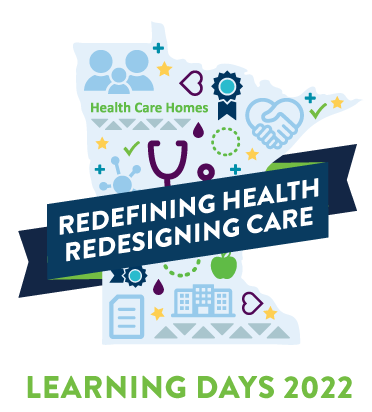
Learning Days
Close to 200 Health Care Homes stakeholders took time out to attend Learning Days 2022! Thanks to everyone who attended for being part of this annual learning event.
Learning Days recorded sessions and resources are available to registered participants on the Learning Days website until the end of December 2022. If you were unable to attend Learning Days live, you can still register and pay to access recorded content and receive certificates of attendance.
Peer-to-Peer Networking
Thanks to everyone who attended the second peer-to peer networking event on May 20, 2022. This pilot program is designed by stakeholders, for stakeholders, and features a different networking topic led by a Health Care Homes representative. Thanks to Savannah Aultman, Alomere Health, for leading the May 20 session on care planning. Evaluations have been positive and we’re improving as we go. The pilot program continues in the fall.
Do you have a Health Equity Story?

Certified Health Care Homes -
Do you have a Health Equity Story that you would like highlighted in the HCH newsletter?
Download the Health Equity Story Form and follow instructions for submission.
Noteworthy

- Congratulations to Native American Community Clinic (NACC)! NACC is a recipient of Stratis Health’s 2022 Building Healthier Communities award. These awards support initiatives that promote a culture of health care quality, equity, and patient safety in Minnesota. NACC will use these funds to expand their self-measured blood pressure (SMBP) program to utilize a web-based portal to track and allow patients to submit home readings to their providers. To read more about Stratis Health’s Building Healthier Communities awards, please visit their website at: Stratis Health building healthier communities
- Minnesota clinics: PR%F Alliance (formerly the Minnesota Organization on Fetal Alcohol Syndrome) has contracted with ACET to conduct a needs assessment and launch a survey to hear from all clinics who did not get a chance to participate in an assessment this June. Please take a minute to click the link below to answer two short questions regarding alcohol use screening and interventions of pregnant individuals, those trying to get pregnant, or at risk of becoming pregnant. The survey is at: https://www.surveymonkey.com/r/MNFASD; the survey closes July 6th.
- The MDH Refugee and International Health Program and Infectious Disease Equity and Engagement Unit has developed three directories for organizations serving diverse communities:
- Health Services Directory - This resource directory of low-cost and immigrant-friendly health services includes a listing of hospitals, clinics, organizations and services that offer dental services, disability services, domestic violence services and sexual assault services, health services, home health services, hotlines, mental health services, and vision services.
- Diverse Media Directory - A quick reference for individuals working to identify appropriate media channels that reach a broad cross section of diverse groups.
- Community-Based Organizations Directory - A quick reference for individuals working to identify appropriate community-based organizations (CBOs) that serve Minnesota's many diverse communities.
- Download the Control Your Diabetes for Life Toolkit today. This resource is designed for anyone willing to guide a patient through the material, like health educators, health care providers, community health workers, family members and others. It contains instructional sheets on 26 self-care topics, a patient action plan for setting goals, and a one-page self-care checklist. Topics include A1C, blood sugar, insulin, heart health, blood pressure, eating, physical activity, checking eyes and feet and more! Also included: the 10 Simple Steps handout, an outline of steps to take for enjoying a healthy life with diabetes. For feedback or questions, email health.diabetes@state.mn.us.
- Check out the new Center for Opioid Resources and Education (CORE) webpage for recovery tools and resources for opioid and other substance use disorders. CORE supports clinical and non-clinical health care professionals in responding to the opioid public health emergency by bridging care gaps in disadvantaged, rural, and underserved populations, as part of the Stratis Health Opioid Addiction in Rural (SOAR) Extension for Community Healthcare Outcomes (ECHO) online learning series.